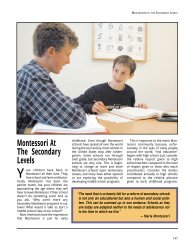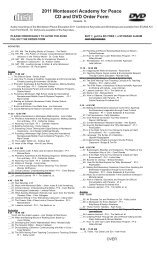Tim Seldin & Paul Epstein Ph.D. An Education for Life
Tim Seldin & Paul Epstein Ph.D. An Education for Life
Tim Seldin & Paul Epstein Ph.D. An Education for Life
Create successful ePaper yourself
Turn your PDF publications into a flip-book with our unique Google optimized e-Paper software.
216<br />
Does Montessori<br />
prepare children<br />
<strong>for</strong> the<br />
“real” world? ...<br />
I<br />
started learning about<br />
and teaching using the<br />
Montessori Method in<br />
1960. It is now over <strong>for</strong>ty years later. Then<br />
I taught about it, ran a Montessori school,<br />
served on the AMS Board, and always had<br />
to answer: “But will the children adjust<br />
to other schools and do well in life?”<br />
To this question, I had flip answers,<br />
hope-filled replies, and much conviction;<br />
but now I have experience. Also, I have<br />
comparisons, having run two non-<br />
Montessori schools. In addition, I’ve had<br />
a post-Montessori career in corporate life<br />
(CBS-TV) and have run a foundation,<br />
which raised funds <strong>for</strong> over six hundred<br />
independent colleges. The simple answer<br />
to the question as to whether Montessori<br />
prepares students to survive in other<br />
schools is yes! To compete, yes! Prosper,<br />
yes! <strong>An</strong>d these replies are not boasts —<br />
they are my pleasant reality.<br />
First, children generally survive well<br />
beyond the expectations of parents and<br />
educators. God, or nature made, they<br />
are built to endure and overcome.<br />
“Overcoming” Montessori is really easy,<br />
because it is like basic training <strong>for</strong> life; it<br />
engages the senses, acknowledges physical<br />
mobility, and respects the need to<br />
manage time. It follows the individual<br />
intellect, while providing an adequate<br />
dose of reality and Practical <strong>Life</strong> skills.<br />
Most important is: How does the student<br />
think (s)he has done, “given their<br />
givens? Montessorians do not make<br />
genes or create home environments —<br />
we run schools and help parents grow<br />
along with their children using a scientifically<br />
enlightened model and a practical<br />
psychology and pedagogy. Maria Montessori<br />
gathered the insights, time refined<br />
them, and time refines them still. This is<br />
what I call the verb — Montessori as<br />
action, not just a proper noun. I respect the<br />
noun; I love the verb.<br />
For fourteen years, I sent kids off to other<br />
schools while working within and heading<br />
the Whitby School (The American Montessori<br />
Center [est.1958]). I watched and<br />
collected data. After years of working in business<br />
and running two other schools, I’ve collected<br />
much in<strong>for</strong>mation. Watching my own<br />
children, grandchildren, neighbors, nieces/<br />
nephews, et. al, I can simply say that<br />
Montessori allows and helps children to be<br />
physicians, lawyers, business executives,<br />
educators, authors, film makers, mothers/<br />
fathers, computer experts, writers, musicians,<br />
politicians; survivors of college folly,<br />
parental divorce; and seekers of the mysteries<br />
of life through faith, religion, nature or<br />
philosophy. In brief, nothing in Montessori<br />
guarantees success or the absolute avoidance<br />
of all of life’s follies and failures. It does<br />
provide many tools and, in most cases, tools<br />
not commonly exploited in many other educational<br />
systems. Dr. Montessori was an<br />
excellent physician and an even greater educator.<br />
She was not, and is not, God; neither<br />
are those who use and advance her Method.<br />
But if you simply want children to enjoy<br />
their education, use their senses, find uses<br />
<strong>for</strong> imagination and inventiveness, and<br />
respect natural timing, while also respond-<br />
ing to fire drills and traffic signs;<br />
Montessori is a good bet. If you want me or<br />
others to say it is the only way to educate<br />
or the best, we respond by saying,<br />
“... among great foods, we choose this<br />
Montessori diet.” If you want guarantees,<br />
we caution you to watch out <strong>for</strong> snake-oil<br />
salesmen. Montessori was not a huckster<br />
and neither are we a hundred years later.<br />
Our students reveal their talents; we direct<br />
their learning. God or nature, along with<br />
their mothers and fathers and their socioeconomic<br />
realities, play roles as well.<br />
Montessori prepares children to use their<br />
talents, advancing their natural abilities<br />
and taking that development into an everchanging<br />
world.<br />
Montessori students are the best evidence<br />
of their preparation. Seek them out.<br />
Speak with them. Observe them. It is likely<br />
you have already noticed them, perhaps<br />
even hired them, and maybe you already<br />
like them. What you did not know was that<br />
they were educated, in part, within a<br />
Montessori environment.<br />
— John P. Blessington,<br />
Headmaster Emeritus of<br />
The Whitby School; Currently Executive<br />
Producer <strong>for</strong> Interfaith Religious<br />
Programs <strong>for</strong> CBS Television




